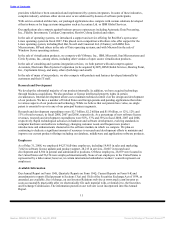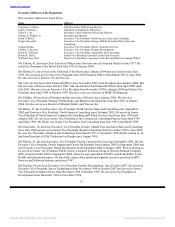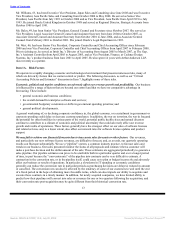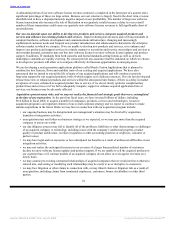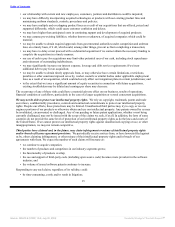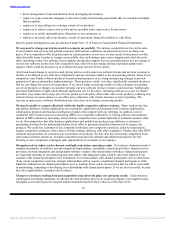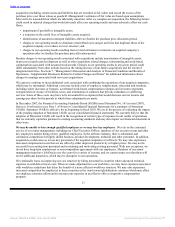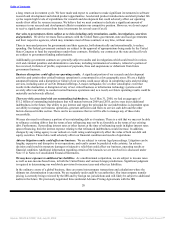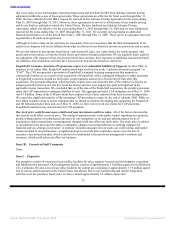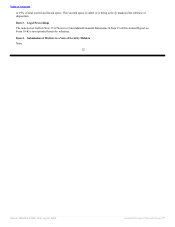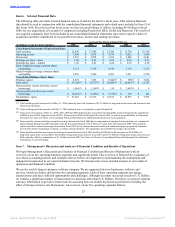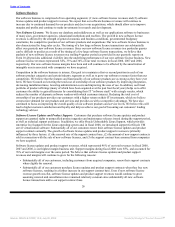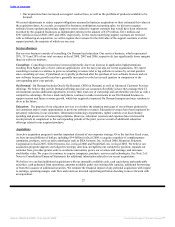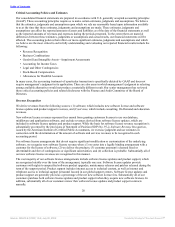Oracle 2007 Annual Report Download - page 26
Download and view the complete annual report
Please find page 26 of the 2007 Oracle annual report below. You can navigate through the pages in the report by either clicking on the pages listed below, or by using the keyword search tool below to find specific information within the annual report.
Table of Contents
that cover many of our intercompany transfer pricing issues and preclude the IRS from making a transfer pricing
adjustment within the scope of these agreements. These agreements are effective for fiscal years through May 31,
2006. We have submitted to the IRS a request for renewal of this Advance Pricing Agreement for the years ending
May 31, 2007 through May 31, 2011. However, these agreements do not cover all elements of our transfer pricing
and do not bind tax authorities outside the United States. We have finalized one bilateral Advance Pricing
Agreement, which was effective for the years ending May 31, 2002 through May 31, 2006 and we have submitted a
renewal for the years ending May 31, 2007 through May 31, 2011. We currently are negotiating an additional
bilateral agreement to cover the period from June 1, 2001 through May 31, 2008. There can be no guarantee that such
negotiations will result in an agreement.
Although we believe that our tax estimates are reasonable, there is no assurance that the final determination of tax
audits or tax disputes will not be different from what is reflected in our historical income tax provisions and accruals.
We are also subject to non-income based taxes, such as payroll, sales, use, value-added, net worth, property and
goods and services taxes, in both the United States and various foreign jurisdictions. We are regularly under audit by
tax authorities with respect to these non-income based taxes and may have exposure to additional non-income based
tax liabilities. Our acquisition activities have increased our non-income based tax exposures.
PeopleSoft’s Customer Assurance Program may expose us to substantial liabilities if triggered. In June 2003, in
response to our tender offer, PeopleSoft implemented what it referred to as the “customer assurance program” or
“CAP”. The CAP incorporated a provision in PeopleSoft’s standard licensing arrangement that purports to
contractually burden us, as a result of our acquisition of PeopleSoft, with a contingent obligation to make payments
to PeopleSoft customers should we fail to take certain business actions for a fixed period of time after this
acquisition. The payment obligation, which typically expires four years from the date of the contract, is fixed at an
amount generally between two and five times the license and first year support fees paid to PeopleSoft in the
applicable license transaction. We concluded that, as of the date of the PeopleSoft acquisition, the penalty provisions
under the CAP represented a contingent liability of ours. The aggregate potential CAP obligation as of May 31, 2008
was $1.9 billion. Some of the CAP provisions have expired or have been removed from these license arrangements.
We expect the significant majority of the remaining CAP provisions to expire by the end of calendar 2008. While we
have taken extensive steps to assure customers that we intend to continue developing and supporting the PeopleSoft
and JD Edwards product lines and, as of May 31, 2008, we have not received any claims for CAP payments,
PeopleSoft customers may assert claims for CAP payments.
Our stock price could become more volatile and your investment could lose value. All of the factors discussed in
this section could affect our stock price. The timing of announcements in the public market regarding new products,
product enhancements or technological advances by our competitors or us, and any announcements by us of
acquisitions, major transactions, or management changes could also affect our stock price. Our stock price is subject
to speculation in the press and the analyst community, changes in recommendations or earnings estimates by
financial analysts, changes in investors’ or analysts’ valuation measures for our stock, our credit ratings and market
trends unrelated to our performance. A significant drop in our stock price could also expose us to the risk of
securities class actions lawsuits, which could result in substantial costs and divert management’s attention and
resources, which could adversely affect our business.
Item 1B. Unresolved Staff Comments
None.
Item 2. Properties
Our properties consist of owned and leased office facilities for sales, support, research and development, consulting
and administrative personnel. Our headquarters facility consists of approximately 2.0 million square feet in Redwood
City, California. We also own or lease office facilities for current use consisting of approximately 17.9 million square
feet in various other locations in the United States and abroad. Due to our restructuring and merger integration
activities over the past three fiscal years, we have vacated approximately 3.8 million square feet
21
Source: ORACLE CORP, 10-K, July 02, 2008 Powered by Morningstar® Document Research℠


